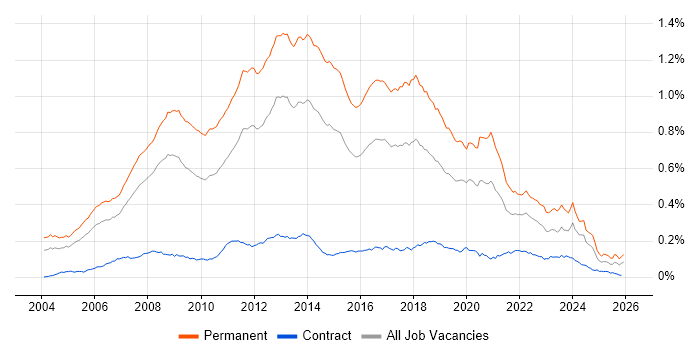.NET Software Developer
UK
The median .NET Software Developer salary in the UK is £65,000 per year, according to job vacancies posted during the 6 months leading to 23 February 2026.
The table below compares current salary benchmarking and summary statistics with the previous two years.
|
|
6 months to
23 Feb 2026 |
Same period 2025 |
Same period 2024 |
| Rank |
565 |
590 |
504 |
| Rank change year-on-year |
+25 |
-86 |
+104 |
| Permanent jobs requiring a .NET Software Developer |
96 |
84 |
316 |
| As % of all permanent jobs in the UK |
0.14% |
0.17% |
0.42% |
| As % of the Job Titles category |
0.15% |
0.19% |
0.44% |
| Number of salaries quoted |
94 |
74 |
304 |
| 10th Percentile |
£45,000 |
- |
£38,250 |
| 25th Percentile |
£50,000 |
£31,250 |
£45,000 |
| Median annual salary (50th Percentile) |
£65,000 |
£50,000 |
£60,000 |
| Median % change year-on-year |
+30.00% |
-16.67% |
+9.09% |
| 75th Percentile |
£114,063 |
£55,625 |
£98,125 |
| 90th Percentile |
£143,750 |
£60,000 |
£142,500 |
| UK excluding London median annual salary |
£65,000 |
£47,500 |
£50,000 |
| % change year-on-year |
+36.84% |
-5.00% |
-0.99% |
For comparison with the information above, the following table provides summary statistics for all permanent IT job vacancies. Most job vacancies include a discernible job title that can be normalized. As such, the figures in the second row provide an indication of the number of permanent jobs in our overall sample.
| Permanent vacancies in the UK with a recognized job title |
62,963 |
43,992 |
71,553 |
| % of permanent jobs with a recognized job title |
91.36% |
91.41% |
94.79% |
| Number of salaries quoted |
39,692 |
23,186 |
55,777 |
| 10th Percentile |
£29,000 |
£32,750 |
£28,500 |
| 25th Percentile |
£37,500 |
£45,000 |
£39,268 |
| Median annual salary (50th Percentile) |
£55,000 |
£60,000 |
£55,000 |
| Median % change year-on-year |
-8.33% |
+9.09% |
-8.33% |
| 75th Percentile |
£75,000 |
£80,000 |
£73,750 |
| 90th Percentile |
£95,000 |
£100,000 |
£92,500 |
| UK excluding London median annual salary |
£50,000 |
£55,000 |
£50,000 |
| % change year-on-year |
-9.09% |
+10.00% |
-4.76% |
.NET Software Developer
Job Vacancy Trend
Historical trend showing the proportion of permanent IT job postings featuring '.NET Software Developer' in the job title relative to all permanent IT jobs advertised.
.NET Software Developer
Salary Trend
Salary distribution trend for .NET Software Developer job vacancies in the UK.
.NET Software Developer
Salary Histogram
Salary distribution for jobs citing .NET Software Developer over the 6 months to 23 February 2026.
.NET Software Developer
Top 13 Job Locations
The table below looks at the demand and provides a guide to the median salaries quoted in IT jobs citing .NET Software Developer within the UK over the 6 months to 23 February 2026. The 'Rank Change' column provides an indication of the change in demand within each location based on the same 6 month period last year.
| Location |
Rank Change
on Same Period
Last Year |
Matching
Permanent
IT Job Ads |
Median Salary
Past 6 Months |
Median Salary
% Change
on Same Period
Last Year |
Live
Jobs |
| England |
+55 |
91 |
£70,000 |
+33.33% |
21 |
| UK excluding London |
+12 |
76 |
£65,000 |
+36.84% |
17 |
| Work from Home |
+53 |
47 |
£112,500 |
+246.15% |
14 |
| South East |
+22 |
33 |
£112,500 |
+87.50% |
1 |
| London |
+41 |
21 |
£100,000 |
+66.67% |
5 |
| North of England |
-13 |
17 |
£65,000 |
+30.00% |
10 |
| South West |
- |
14 |
£50,000 |
- |
5 |
| North West |
+5 |
9 |
£45,000 |
-10.00% |
5 |
| Yorkshire |
- |
8 |
£65,000 |
- |
5 |
| East of England |
-1 |
6 |
£55,000 |
+3.77% |
1 |
| Wales |
- |
5 |
£45,000 |
- |
|
| Midlands |
0 |
1 |
£50,000 |
-13.04% |
|
| East Midlands |
- |
1 |
£50,000 |
- |
|
.NET Software Developer Skill Set
Top 30 Co-Occurring Skills & Capabilities
For the 6 months to 23 February 2026, .NET Software Developer job roles required the following skills and capabilities in order of popularity.
The figures indicate the absolute number of co-occurrences and as a proportion of all permanent job ads featuring .NET Software Developer in the job title.
.NET Software Developer Skill Set
Co-Occurring Skills & Capabilities by Category
The following tables expand on the one above by listing co-occurrences grouped by category. They cover the same employment type, locality and period, with up to 20 co-occurrences shown in each category:


